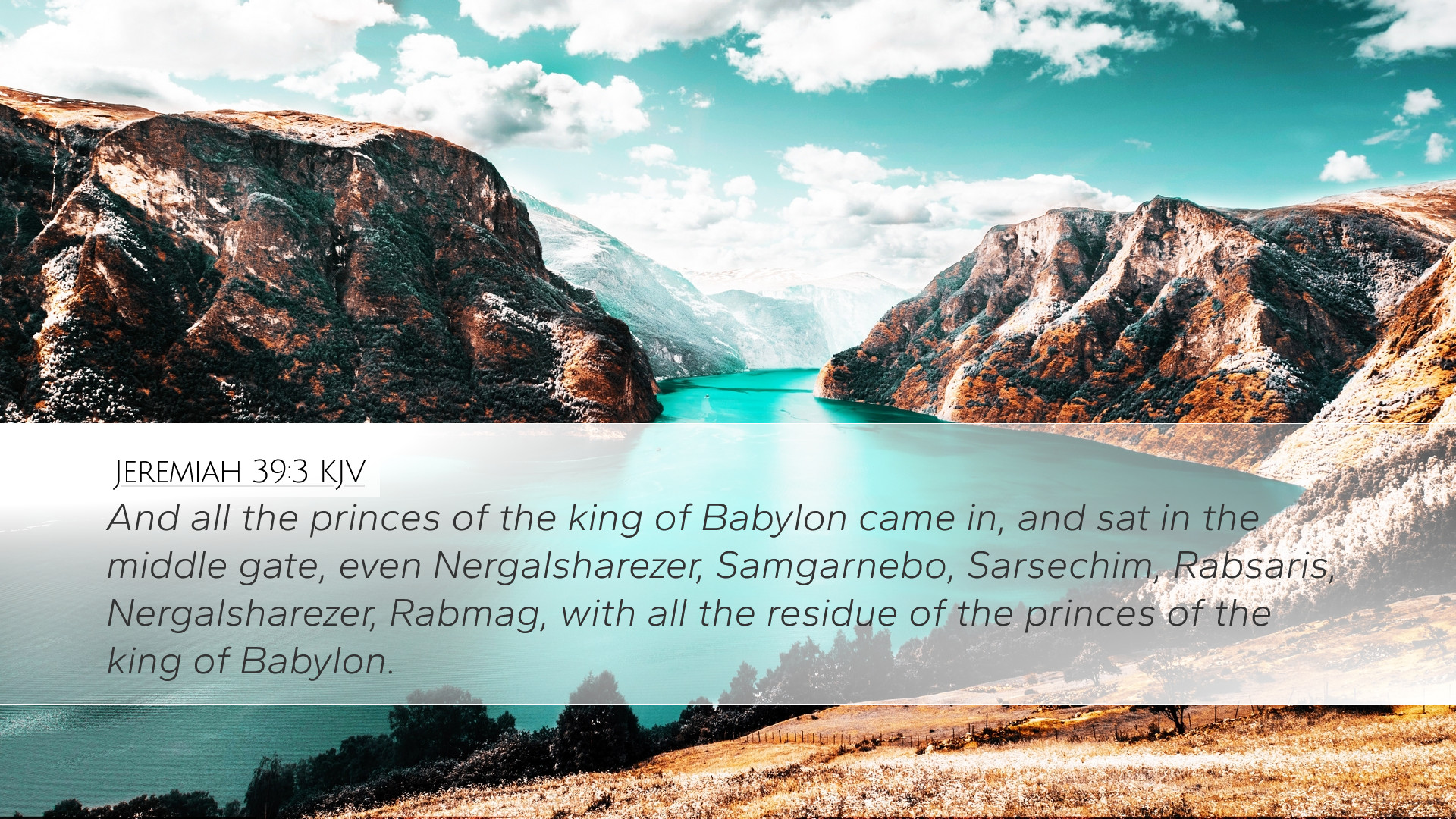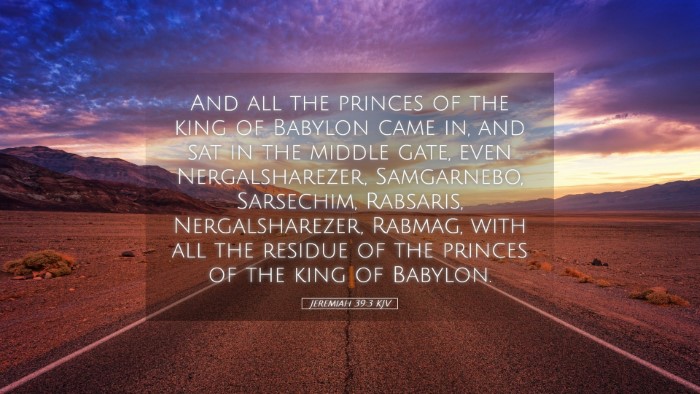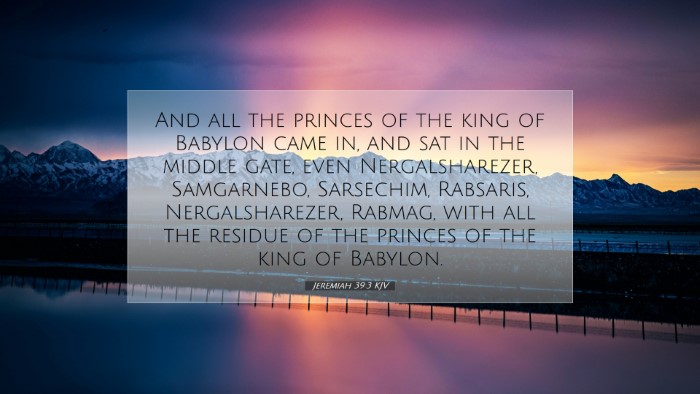Commentary on Jeremiah 39:3
Jeremiah 39:3 presents a critical moment in the narrative of the fall of Jerusalem and the consequential events that shaped the future of the Israelite people. The verse states:
"And all the princes of the king of Babylon came in, and sat in the middle gate, even Nergalsharezer, Samgarnebo, Sarsechim, Rabsaris, Nergalsharezer, Rabmag, with all the residue of the princes of the king of Babylon."
This verse encapsulates the Babylonian invasion's political and military reality, which serves as a backdrop for crucial theological reflections and practical lessons.
Historical Context
The fall of Jerusalem occurred in 586 BC when King Nebuchadnezzar of Babylon laid siege to the city. Jeremiah's prophecy had consistently warned the people about the impending destruction due to their unfaithfulness to God. The arrival of Babylonian princes in Jerusalem signifies the completion of this prophetic judgment.
Insights from Matthew Henry
Matthew Henry emphasizes the fulfillment of God's word through the actions of the Babylonian leaders. He highlights:
- The Sovereignty of God: Henry remarks that God uses even wicked nations to execute His judgment. This divine sovereignty underscores the belief that no authority exists outside God’s supreme control.
- Judgment on Israel: The arrival of the Babylonian princes represents the culmination of Israel's rebellion against God. Henry notes that this teaches a vital lesson on the consequences of straying from divine commandments.
- Leadership and Authority: The mention of princes reflects the structure of authority. Henry posits that God can put leaders in place for His purposes, which serves as a reminder for current leaders to exercise their authority with humility before God.
Insights from Albert Barnes
Albert Barnes provides a detailed exegetical approach to this passage and offers several key observations:
- Historical Significance: Barnes describes the moment as a historical turning point for Israel, highlighting the gravity of the situation faced by the Israelites as foreign princes took control of their city.
- The Role of Prominent Figures: Barnes identifies each prince mentioned, explaining their roles in the Babylonian hierarchy, which reflects the organized nature of Nebuchadnezzar's administration and the seriousness of the conquest.
- Prophetic Fulfillment: The presence of these princes is seen as a fulfillment of Jeremiah's prophecies of devastation. Barnes connects this to the broader theme of God’s justice executed through human agents.
Insights from Adam Clarke
Adam Clarke provides a pastoral dimension to the interpretation, focusing on the implications for the people of Israel and the wider spiritual lessons:
- Human Condition: Clarke reflects on the despair felt by the besieged people and contrasts it with God’s eternal purpose. He notes that even in dire circumstances, God’s sovereignty assures believers of His control over all events.
- Case for Repentance: The commentary stresses the importance of repentance, as the presence of Babylonian leaders was an opportunity for the remnant to seek restoration with God.
- Cautionary Tale: Clarke issues a warning against complacency among the faithful, urging them to remember that God’s patience does not last forever and consistent disobedience leads to judgment.
Theological Themes
Several significant themes emerge from Jeremiah 39:3 that are crucial for theological reflection:
- Judgment and Mercy: The dichotomy of judgment versus God’s mercy is palpable in this narrative. While the prophets warned of impending doom, there was still an offer for repentance and restoration throughout their messages.
- Divine Sovereignty: The passage reveals the theme of God’s sovereignty over nations and leaders. It serves as a reminder for contemporary readers about the power of God in historical and personal contexts.
- Hope amid Despair: While the verse marks a low point for Israel, it also sets the stage for future redemption. The continued relationship between God and His people is central to the narrative.
Practical Applications
For pastors, students, theologians, and scholars, Jeremiah 39:3 encourages several practical takeaways:
- Understanding History: The historical events captured in this verse help inform our understanding of God’s overarching narrative with humanity. It offers context for contemporary issues faced by individuals and communities.
- Encouragement in Trials: Just as the Israelites faced dire circumstances, believers today are called to trust in God’s sovereignty, regardless of their situation. This verse reassures that God is at work even when circumstances suggest otherwise.
- Call for Faithfulness: The commentary prompts individuals to reflect on their own lives, urging constant vigilance against complacency, and a sincere commitment to God’s ways to avoid the pitfalls seen in Israel’s history.
Conclusion
Jeremiah 39:3 encapsulates a crucial moment that reflects the consequences of human disobedience, the fulfillment of prophecy, and the sovereignty of God through the historical narrative of Israel. The insights gathered from revered public domain commentaries remind us of the ever-relevant lessons we learn through Scripture about faith, judgment, and the mercy of God.


